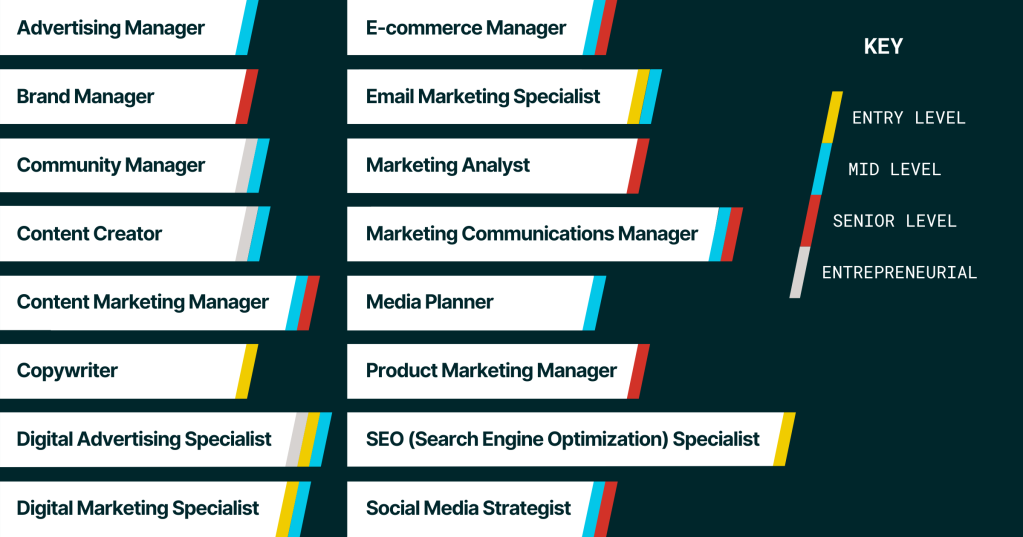Launch your career in marketing, a vibrant field where creative and data-driven worlds collide. As a marketing professional, you will have opportunities to tell meaningful stories that shape and drive business outcomes. Whether it’s designing impactful brand campaigns or conducting relevant research, marketing professionals are essential when it comes to connecting products and services with target audiences. This is a rewarding career path for those who value tangible results and want to make a lasting impact in an ever-evolving industry.
Not convinced yet? Here are a few data points to give you an idea of what the industry has to offer and where it’s heading.

What can I do with marketing skills?
Marketing professionals hold essential and diverse roles due to their creative expertise and unique perspectives. Let’s explore some key responsibilities commonly associated with individuals who possess marketing skills:
Brand oversight — Craft and maintain a cohesive brand identity, ensuring that messaging and visuals are in alignment across all marketing channels. Make brand adjustments in response to visibility, recognition, and overall engagement.
Campaign curation — Design, implement, and iterate marketing campaigns that resonate with targeted populations and align with a product, brand, or goal. Campaign development spans the entire process from ideation to asset delivery.
Content strategy development — Visualize, create, and manage high-level content strategies that center around business priorities and relevant stakeholders. This can include everything from content planning and production to audience management and retention.
Market analysis — Conduct research to identify key metrics and relevant indicators for consumer preferences, campaign effectiveness, and market movements.
Performance tracking and refinement — Monitor marketing performance through the utilization of tools, key performance indicators (KPIs), and digital platforms. Use those findings and relevant technologies to optimize initiatives for desired audiences and outcomes.
Marketing skill sets are game changers for businesses, allowing them to optimize brand visibility, establish trust with users, and, ultimately, succeed in competitive markets.
To know where your skill set fits within this industry, sometimes all it takes is a little research. Listen as Angela Abad, social media marketing manager, shares what she loves about the field:

One of the things that I most enjoy about marketing is that is mentally stimulating. It’s never boring. You’re always learning with every company, every client, every campaign, every ad, everything that you put out is new. It gives you different results and outcomes. And you are always thinking about strategies and how to change it, and how to make it better, and there is always room for improvement, and it is always opening doors to learn more and opening new paths, to move forward in different areas. And that’s really, really good.
Discover your career opportunities
Gaining marketing expertise can open up a wide range of career opportunities across different fields and subject matters. Here are some roles that are available to candidates with this skill set:

Please keep in mind that these roles are listed as examples of ones you might discover. Each organization has variations in its structure and naming conventions, and therefore, you may find that this categorization is not universally applicable. Always make sure to do your research when applying to roles to make sure that you are appropriately qualified.
Expert advice
“The marketing industry is unique due to its constant changes, data-driven approach, and global reach. It’s about adapting fast, connecting with people, and gaining practical experience using the tools and technologies you’ve learned. There’s a big difference between knowing in theory and doing it in practice.”
— Sarah Han, career expert at edX

How can I acquire marketing skills and turn them into a career?
If you’re interested in pursuing your own career in marketing, consider these steps:
Research is key when it comes to any career, and a career in marketing is certainly no exception. Take advantage of all the information that’s out there, whether it’s through browsing the internet for job titles, listening to relevant podcasts, reading books on the topic, or getting connected to professionals in the areas or positions that interest you.
Pro tip:
Explore your career possibilities. As part of your research, take every opportunity to learn more about topics in your desired field. Browse the edX course catalog at edx.org to see what marketing-related topics, courses, and programs interest you, and start building your marketing skill set today.
One key part of the research phase is networking. This simple step is often overlooked and undervalued but can significantly impact your career trajectory. To clarify your career goals and aspirations, you must talk with professionals about what the work looks like in actuality.
Pro tip:
Take advantage of the unique networking opportunities that exist within marketing and other creative industries. During your research phase, you may discover a variety of marketing events, meetup groups, and relevant associations that you can join to learn from experts and propel your career forward.
You open a door of opportunity in your career by reaching out to professionals in your targeted fields, positions, and companies. Connecting with marketing professionals who could vouch for you and provide hard-to-find intel about the industries or organizations of interest is invaluable.
Pro tip:
We highly recommend scheduling informational interviews. These interactions provide an opportunity to learn from and connect with marketing professionals and to gather information from or gain exposure to hiring managers. These contacts can help you learn new skills, offer advice or insights, and share job opportunities.
Check out our Networking Guide and Outreach Templates and Resources for help getting started.
To supplement your understanding of what others are doing professionally, gain clarity on your own goals and aspirations. Ask yourself what about marketing interests you — the possibilities are endless.
A bachelor’s degree is typically all the formal education that’s required to get started in the field of marketing, so your success is mostly contingent on the skills and experiences that set you apart.
Take time to identify the specific areas of marketing that you’re most interested in and skilled at. Whether that’s content creation, social media management, data analysis, or SEO, honing in on those areas of interest will help you focus your efforts on acquiring any useful expertise.
Ask yourself which type of work you’d like to participate in, and always make sure to consider the skills that align with your career goals and the demands of the shifting job market. Here are a few marketing skill sets that could directly apply to your career, organized by traditional domains of work:
Data and analytics
- Data analytics
- Data visualization
- Marketing analytics
- Search engine optimization (SEO)
- Predictive analytics
Customer experience
- Relationship management
- User research
Branding and content
- Branding and engagement
- Content marketing
- Copywriting
- Digital content creation
- Social media marketing
- Storytelling
Industry insight:
According to an analysis of LinkedIn’s internal data, “The Most Valuable Digital Marketing Skills to Have on Your LinkedIn Profile This Year” (2022), the skills that correspond with in-demand marketing roles include social media marketing, paid search strategy, search engine marketing, social media fluency, and general marketing knowledge.
Strategic planning and management:
- Communications
- Digital marketing
- Marketing management
- Marketing strategy
- Growth marketing
Transferable skills:
Transferable skills are the skills you carry from one job to another, enhancing your adaptability and versatility. In the realm of marketing, these skills are especially valuable, given the field’s reliance on diverse perspectives, experiences, and competencies. Consider incorporating or highlighting some of the following skills in your career journey: Creativity, critical thinking, design, negotiation, and project management.
There are a variety of mediums through which you can learn marketing skills. Consider which route best fits your needs and learning style. Here are a few options to consider:
Self-education — If you want to learn asynchronously, informally, or casually, self-education is a great place to start. Many approaches to this learning style support various career goals, budgets, learning preferences, and time commitments. Here are some ways to self-educate in marketing:
- Informal opportunities: Gain a greater understanding of the industry by reading. Explore books and articles to expand your marketing knowledge and learn what’s happened or is happening in the field. Not a reader? Plenty of videos, podcasts, and other forms of multimedia can teach you a thing or two about careers related to marketing.
- Online Courses: If you prefer a more structured or socialized learning experience, online courses might be a good option. edX.org offers several instructor-led and self-paced marketing courses that may be of interest.
- Professional certifications: When you want a less casual learning experience but don’t have needs that warrant a boot camp or degree, professional certifications may be the best fit for you. Professional certifications are a great addition to your resume and build your skills for roles in marketing. edX.org offers many marketing and marketing-adjacent certificate programs that may interest you.
Boot camps — Experienced curriculum teams design these innovative programs to help you achieve your career goals in a fraction of the time it takes to complete a traditional degree. With many boot camps lasting just 3–12 months, you’ll be amazed at how quickly you can gain the knowledge and expertise you need to launch your dream career. Explore popular marketing boot camps on edX.org.
Marketing degrees — Pursuing a degree in marketing means gaining a comprehensive understanding of the principles and strategies behind effective product and service promotion, consumer-based thinking, and so much more! It equips you with a range of skills and knowledge that can be applied across various subject matters.
Employers hiring for marketing roles may require a portfolio to demonstrate your ability to create compelling content, manage campaigns, analyze data, and more. Even if portfolios aren’t mandatory for your specific applications, we believe they serve as an excellent means to distinguish yourself as a standout candidate.
A well-organized and visually appealing portfolio is a powerful tool that can highlight your skills, experiences, and successes in marketing or adjacent work. It allows employers to see how you can directly contribute to their outcomes and makes a strong case for why you’re the ideal candidate for a position.
Expert advice
“Get to know people in the field and get their feedback on your portfolio. Hearing feedback from folks already in the marketing space will give you a competitive advantage over the rest of the candidates.”
— Sarah Han, career expert at edX

Helpful resources:
The career team at edX has resources and workshops to help you as you navigate a potential career in marketing.
As you prepare, make sure to get clear on who you are and what you want professionally. Especially in a creative field like marketing, the way you brand yourself and tell your story matters. Check out our Brand Statement Guide for more.
Once your professional brand is locked in, you can use it to polish or create your application materials and prepare for interviews. Visit our Marketing Brand Statement Samples and Marketing Resume Sample for additional guidance.
Once you achieve your marketing career goal, make sure to celebrate your success. The career journey is full of ups and downs, and every victory deserves acknowledgment.
With that said, your journey doesn’t end here — it’s only just beginning. Give yourself grace and understand that careers are not linear. Here are some ways you could continue growing your marketing skills.
Continued learning — Always reference our course catalog on edX.org for continued learning opportunities. It never hurts to brush up on your skills, expand your knowledge within the industry, or learn about other subjects that could apply to your work, interests, or something in between.
Promotions — As technology continues to advance, career opportunities in marketing are following suit. To position yourself well for promotions, you might want to stay current on digital technologies and trends, find a subject matter to specialize in or pursue leadership opportunities.
Promotions in marketing:
Here are a few senior roles that you may want to work toward as you advance your career in marketing:
Marketing analytics director: Oversees the analysis and tracking of marketing data and utilizes insights to guide strategic marketing decisions.
Marketing director: Oversees and leads movement of an organization’s strategic marketing plans from development to execution.
Chief marketing officer (CMO): Oversees an organization’s marketing vision, strategy, and direction.
Pivots — Make sure to regularly check in with yourself and your satisfaction with daily tasks. If you are dissatisfied in your current role, take stock of what you like and dislike about it, keep your eyes out for company-sponsored growth opportunities, and pursue career pivots that optimize your background, skill set, and interests.
Industry insight:
As the tech landscape continues to evolve, the demand for marketers with digital expertise does too. If you find yourself interested in the ways that audiences engage with and connect through digital content and platforms, this may be a great area of growth for you!
What could my career look like with a marketing skill set?
It is difficult to say exactly what your life would look like with a marketing skill set, but we can provide some insight. Consider how these may factor into your life plan:
Creative outlet — Marketing roles require diverse skills, including content creation, data analysis, social media management, and graphic design, providing avenues for continuous learning and endless creative output. It’s a dynamic field that allows you to try new things, unleash your imagination, and shape ideas into reality.
Multi-industry relevant — A marketing skill set opens doors to a wide variety of industries, allowing you to apply your expertise to different subject matters like technology, healthcare, fashion, and more. It’s a versatile toolkit that enables you to connect with audiences, promote products or services, drive business success across diverse fields, and boost your own employability.
Remote opportunities — In 2021, LinkedIn internal data showed that remote marketing roles increased by 177% over a 6-month time period. As remote teams and work structures become more standardized, marketing professionals in a range of specializations, from social media to SEO, have access to more flexible work arrangements.
Growth opportunities — As a marketing professional, you have many paths to continued success and fulfillment. By mastering new digital channels, diving into data analytics, pursuing leadership roles, exploring international markets, or staying on top of consumer trends, you can chart a path for unique career opportunities and constant professional growth.
Expert advice
“I’m going to give an overview: it’s strategize, plan, create, proof, revise, edit, deploy, analyze, optimize, repeat. Whatever stage of marketing [you’re in], whatever your tier is within an organization, whether you’re entry level or VP, those are the components of marketing. And that’s how you start from beginning to end. You do that for every channel and for every touch point that you have with your customers.”
— Laurel Ciliberti, email & marketing manager

What are my next steps?
Learn about marketing:
Register for a course on edX to learn about a variety of topics within the field of marketing, such as Online Advertising and Social Media, Marketing Analytics, and Relationship Marketing Strategy for Financial Services.
Watch a session:
Watch a relevant session on our Events page to learn more about the industry and other professionals.










